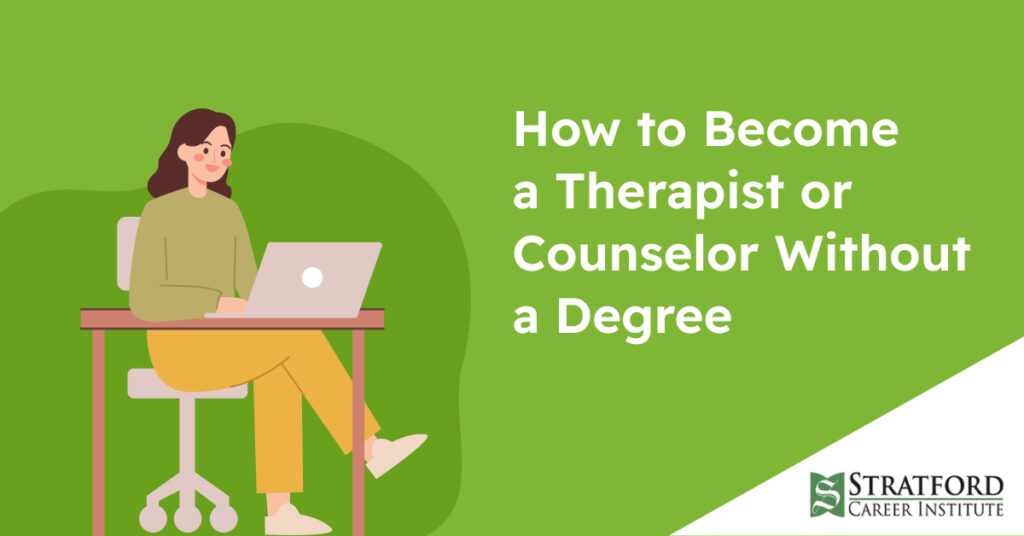
Do you want a career where you help others overcome their problems?
If so, you may be wondering what it takes to become a therapist or counselor.
However, what if you don’t have a college degree?
Here’s how to become a therapist without a degree and an overview of your career options.
Before we begin, it’s important to note that many counseling positions which involve mental health require at least a master’s degree. However, this isn’t necessarily the case with every type of counseling.
Here are some steps you can take to learn more about how to work toward in a counseling field without a degree.
Start in non-degree roles to gain experience, then meet education and licensure requirements to become a licensed counselor.
ENROLL TODAY
1. Figure Out What Type of Counseling Doesn’t Require a Degree in Your State
If you want to know how to become a therapist without a degree, the first step is to look up the requirements for your state.
Every state has its own licensing requirements for anyone working as a counselor. While some positions require extensive training and education, others don’t.
In fact, here are the most popular counseling-related jobs without a degree requirement.
Social Service Assistant

As a social services assistant, you will likely provide vital support to social workers and mental health professionals, offering crucial services to the community.
Your role can involve identifying needs, providing aid, and maintaining accurate records.
Essentially, social service assistants might answer benefit-related questions on childcare, food stamps, and money management. They can also conduct interviews to aid in determining appropriate services based on an individual family’s history.
In the absence of social workers, assistants may oversee many other aspects of community mental health efforts, like educating youth about the consequences of drug use and violence.
By helping in these areas, you have the opportunity to make a significant difference in people’s lives, often providing support they may not have known was available. And since the Bureau of Labor Statistics predicts a 12% increase in openings over the next decade, it is a great option for those who don’t have a degree.
While some of these positions function as assistants for licensed counselors, the work is often similar. You still get to work with people who need advice or guidance and point them in the right direction.
Substance Abuse Counselor
Another popular career choice for those learning how to become a therapist without a degree is substance abuse counseling. While education requirements vary between states, many don’t require a college education.
A substance abuse counselor often takes on the difficult task of addressing addiction and recovery, whether it’s related to alcohol or drugs. They extend their support to clients who voluntarily seek help or are court-ordered to undergo treatment, while also assisting families and friends in navigating the recovery process.
With their expertise and dedication, counselors can play a crucial role in guiding individuals toward overcoming addiction and rebuilding their lives, bringing hope and healing to those in need. If you choose this kind of career, you can work in a variety of settings, ranging from hospitals to rehabilitation centers.
Teacher Aide
Although it’s not what most people think about when considering a counseling career, becoming a teacher aide is another way to work with struggling students.
Since there aren’t that many therapist jobs without a degree requirement, many aspiring counselors start by working in schools with at-risk youth. However, this position usually requires a CPR certification and, depending on what type of school you work in, a passing score on a Title 1 assessment.
Teacher aides usually lend a helping hand in various tasks, like providing one-on-one support to students, clarifying assignment questions, and collaborating with teachers on student progress. They may even work in a separate classroom, assisting students with disabilities or other difficulties. This helps create an engaging learning environment and address individual student needs.
Psychiatric Technician
A mental health or psychiatric technician’s main job is to ensure the health and safety of patients at treatment centers. They are generally responsible for many tasks, which may include assisting during group therapy sessions, administering treatments, and restraining patients having mental health episodes.
While this position usually doesn’t require a degree, it does often require some sort of vocational training. For this reason, it is a good option for those searching how to become a counselor without a degree that are willing to take a few short courses.
Peer Counselor
Believe it or not, peer counseling can be one of the most popular ways for individuals to get experience before deciding if school is right for them. Much like licensed counselors, peer counselors get to assist those struggling with addictions or mental illness.
In fact, they usually do this because they have experience with the same struggles. Many are even in recovery for their own issues. However, this means that they provide invaluable support to patients because it’s easier for them to relate to their struggles.
Even if you aren’t coming from the same place, as long as you have great empathy and listening skills, becoming a peer counselor is a great option. These counselors are usually supervised by a licensed professional but are responsible for many tasks, including providing wellness resources, providing non-crisis support for patients, and referring patients to other programs if needed.
Career Services Provider
Not all counseling jobs have to do with mental health. Some have to do with other aspects of life, such as an individual’s career. If this is something that interests you, and you’re considering counseling jobs without a degree, consider becoming a career services provider
A career counselor is responsible for helping students or, in many cases, private clients navigate their career paths. This can include exploring their aspirations, concerns, and uncertainties as well as their personal and educational background. The goal is to help find and highlight the strengths of the student or client so that they can identify any skill gaps or potential career opportunities.
As you may imagine, this isn’t the immediate choice for those looking for how to become a therapist without a degree. However, it is still a great way to help people make monumental decisions about their future that may affect their mental health.
While some of these positions function as assistants for licensed counselors, the work is often similar. You still get to work with people who need advice or guidance and point them in the right direction.
Explore a New Career!
2. Consider Potential Certifications
In some states, certification programs help prospective counselors gain the necessary skills and experience to work.
However, these programs typically apply to the careers listed above rather than school or mental health counseling. For example, Mental Health America offers certification as a National Certified Peer Specialist (NCPS) for those interested in peer counseling.
For this credential, a candidate must:
- Have a current state certification with 40 or more hours of training OR complete an MHA-approved training;
- Have 3,000 or more hours of supervised work or volunteer experience in peer support programs;
- Provide a professional letter of recommendation; and
- Provide a supervisory letter of recommendation.
In most states, this certification requires only a high school diploma or GED, making it ideal for those with no degree.
Another similar certification exists for those interested in providing career services. The National Career Development Association (NCDA) offers a certification as a Career Services Provider (CCSP), allowing you to offer career services as coach, advisor, trainer, or resume writer.
3. Take an Introductory Course to Counseling
If you’re unsure about what kind of career you want to pursue in counseling, consider taking a course to help you choose. This is a great opportunity for those who aren’t sure if counseling is right for them and can save money when it comes to tuition. Typically, these courses include foundations of social psychology, professional ethics, and evidence-based practice.
Interested in Learning More About Counseling? Enroll in Stratford’s Psychology/Social Work Course
Still thinking about how to become a therapist without a degree? At Stratford Career Institute, we offer an introductory course covering the basics of both psychology and social work.
While becoming a social worker of any kind typically requires a degree, this course is helpful for those who want to know more about the work before enrolling in a college program. Enroll today or contact us for more information.
Become a Counselor Today!

Stratford Career Institute offers a convenient and affordable online course to teach you the basics of psychology and social work.

